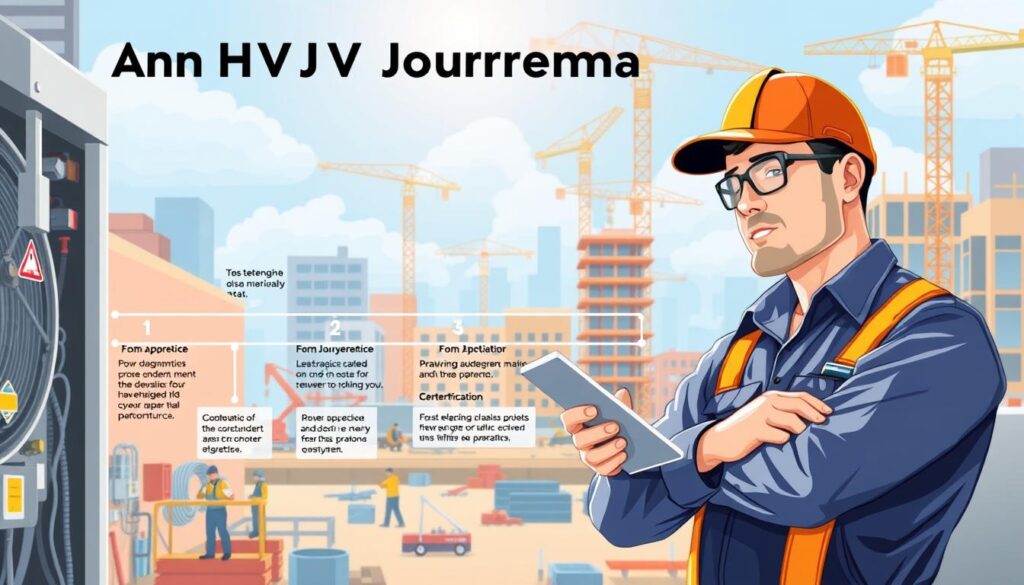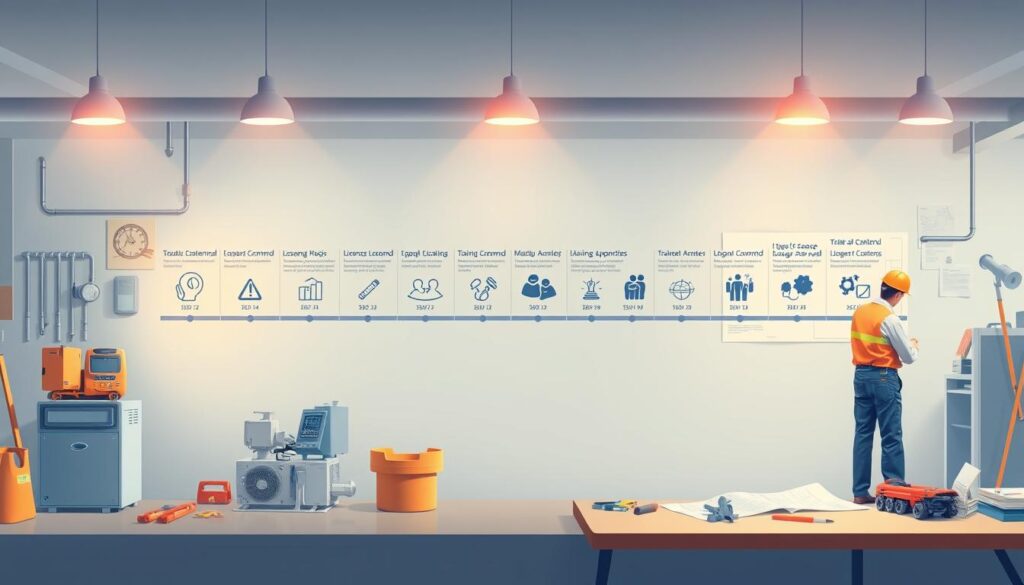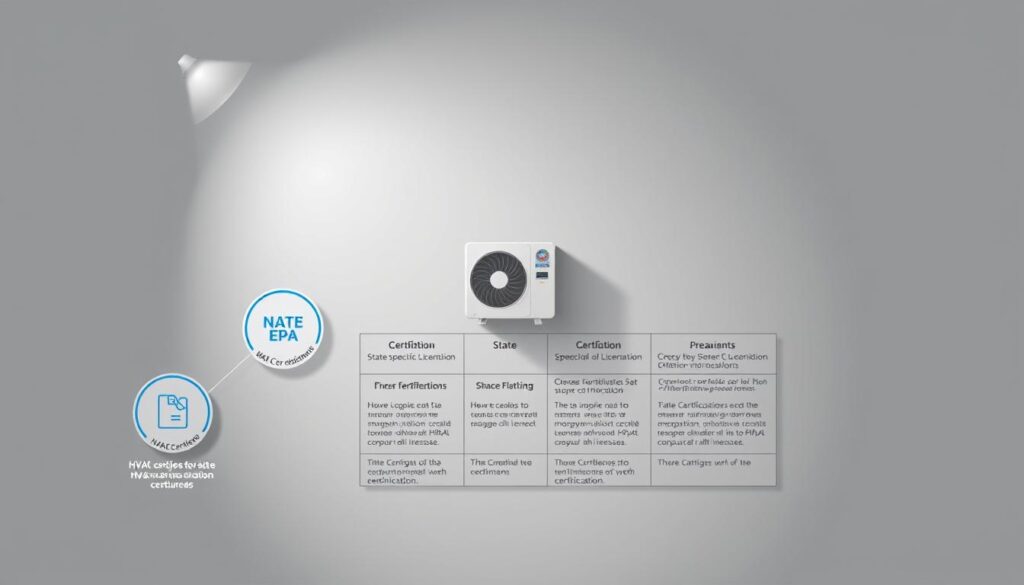Affiliate Disclosure
HVAC Guide Guys is a participant in the Amazon Services LLC Associates Program, an affiliate advertising program designed to provide a means for sites to earn advertising fees by advertising and linking to Amazon.
How Long Does It Take to Become a Journeyman HVAC Technician? Are you curious about how fast you can turn your passion into a profitable HVAC career? Becoming a journeyman HVAC technician might take less time than you think. With hard work and the right training, you could start a rewarding job in just 11 months.

The road to becoming a journeyman HVAC technician requires careful planning and focused education. Training programs offer flexible paths that can speed up your career. Some can be finished in as little as 1 year. This means you could start working in the field sooner than you might have thought.
Your path to becoming an HVAC journeyman is not just about time. It’s about learning all the skills you need. Technical training programs give you a full course in both commercial and residential HVAC. This ensures you’re ready for the real-world challenges you’ll face.
Key Takeaways
- HVAC technician programs can be completed in 11-18 months
- Hands-on experience is key for certification
- Apprenticeship programs usually last 3-5 years
- EPA certification is vital for working with refrigerants
- Career growth opens up with more certifications
Table of Contents
Understanding the HVAC Journeyman Career Path
The HVAC industry is exciting and dynamic. It’s perfect for those who love technical skills and hands-on work. You’ll find a career that mixes technical know-how, problem-solving, and learning.
What is an HVAC Journeyman?
An HVAC journeyman is a skilled technician. They’ve finished a lot of training and got certified in heating, ventilation, air conditioning, and refrigeration. These pros usually spend 3 to 5 years in apprenticeships to become experts.
Role and Responsibilities
HVAC journeyman qualifications include many skills and duties:
- Installing and maintaining complex heating and cooling systems
- Diagnosing technical problems with precision
- Performing advanced repairs on residential and commercial equipment
- Reading and interpreting technical blueprints
- Ensuring system efficiency and safety
“Expertise in HVAC systems is not just a job, it’s a craft that requires dedication and continuous learning.” – Industry Professional
Career Growth Opportunities
The HVAC industry offers great career growth. With a median annual pay of $50,590, technicians can move up from entry-level to journeyman and even master technician. They can also start their own businesses.
| Career Stage | Typical Salary Range | Required Experience |
|---|---|---|
| Apprentice | $39,000 – $45,000 | 0-3 years |
| Journeyman | $50,590 – $64,000 | 3-5 years |
| Master Technician | $64,000 – $80,000 | 5+ years |
Your journey as an HVAC professional is not just a job. It’s a rewarding career with lots of growth and learning opportunities.
Explore Our HVAC Shop
Looking for top-rated HVAC tools, parts, and accessories? Visit our shop and find the perfect solution for your needs.
Visit the ShopBasic Requirements for Starting Your HVAC Journey
Starting an HVAC career means meeting certain basic needs. First, you need to know what qualifications are required to begin. HVAC certifications are key to a strong career.
To start your HVAC training, you’ll need to meet several key prerequisites:
- High school diploma or GED (minimum educational requirement)
- Minimum age of 18 years
- Basic math and reading skills
- Physical fitness for hands-on work
- Clean driving record
Getting to be an HVAC journeyman takes a lot of steps. Most programs suggest the following:
- Obtain a high school diploma or equivalent
- Enroll in an accredited HVAC training program
- Complete 32-40 weeks of technical education
- Begin an apprenticeship (3-5 years of supervised work)
- Acquire necessary certifications
The cost of starting your education can vary a lot. Prices range from $500 to $30,000, depending on the program and location. Many people find that community colleges and trade schools are more affordable ways to start.
Pro Tip: Start preparing early by focusing on math, science, and technical courses in high school to build a strong foundation for your HVAC career.
Physical and technical skills are also vital. You’ll need strength, mechanical aptitude, and problem-solving skills to do well in this challenging but rewarding field.
Explore Our HVAC Shop
Looking for top-rated HVAC tools, parts, and accessories? Visit our shop and find the perfect solution for your needs.
Visit the ShopHVAC Educational Programs and Training Options
Choosing the right HVAC training path is key to a successful career. Your training timeline varies based on the program you pick. Each offers different lengths and learning experiences.
Aspiring HVAC technicians have many educational paths to choose from. Each has its own benefits and requirements for certification:
Trade School Programs
Trade schools are the quickest way to start in HVAC. Here’s what they offer:
- Program duration: 6-12 months
- Average cost: $1,200 – $15,000
- Focused technical training
- Hands-on learning experiences
- Preparation for certification exams
Community College Options
Community colleges provide detailed HVAC education. They also offer additional academic benefits:
- Associate degree programs: 18-24 months
- Average annual cost: $3,440
- General education courses included
- In-depth technical knowledge
- Potential for higher earning
Online Training Possibilities
Digital learning platforms have opened up new HVAC training options:
- Flexible scheduling
- Self-paced learning
- Lower cost alternatives
- Supplemental to hands-on training
| Program Type | Duration | Average Cost | Certification Prep |
|---|---|---|---|
| Trade School | 6-12 months | $1,200-$15,000 | High |
| Community College | 18-24 months | $3,440/year | Very High |
| Online Training | Varies | Lowest | Moderate |
Tip: Always check if your chosen program meets EPA and industry certification requirements for HVAC technicians.
How Long Does It Take to Become a Journeyman HVAC

Figuring out how long it takes to become a journeyman HVAC technician is key for those interested in this career. It usually takes 4 to 7 years, depending on your education and state rules.
On your path to becoming a journeyman HVAC pro, you’ll go through several stages:
- Finishing initial HVAC training (1-2 years)
- Doing an apprenticeship program (4-5 years)
- Getting practical work experience
- Passing state licensing tests
The time it takes to become an HVAC journeyman can change based on many things. For example, some states need different levels of education and experience. In Virginia, you might qualify through:
- Four years of experience with 240 hours of formal training
- An associate’s degree plus two years of work experience
- Specialized engineering degree with one year of experience
The HVAC job market is strong across the country. With over 415,800 HVAC pros in the U.S. and a 6% job growth from 2022 to 2032, becoming a journeyman HVAC technician is a smart move.
Pro tip: While the journey might seem long, each step builds your expertise and increases your earning power in this dynamic field.
Your hard work and skill-building will speed up your journeyman HVAC certification. Stay focused, keep learning, and you’ll be on your way to a great HVAC career.
Explore Our HVAC Shop
Looking for top-rated HVAC tools, parts, and accessories? Visit our shop and find the perfect solution for your needs.
Visit the ShopEssential Skills and Knowledge Required for HVAC Technicians
Getting the right skills is key for success in HVAC. HVAC journeyman qualifications need more than just basic tech knowledge. They require a mix of technical skills and practical use.
Being an HVAC technician means mastering several important skills:
- Electrical system understanding
- Refrigeration cycle comprehension
- System diagnostic capabilities
- Customer service communication
- Problem-solving techniques
Technical skills are the core of HVAC knowledge. You’ll need to grasp complex heating and cooling systems. Also, learn precise measurement and advanced troubleshooting.
| Skill Category | Required Proficiencies | Certification Level |
|---|---|---|
| Electrical Work | Low voltage circuit analysis | EPA 608 Certification |
| Refrigerant Handling | Pressure system management | Section 608 Technician Certification |
| System Installation | Residential and commercial setup | NATE Certification |
Soft skills are just as vital in your HVAC career. Effective communication, teamwork, and customer service can make you stand out. Employers look for technicians who can explain complex issues simply.
Keep learning to stay ahead. Stay current with new tech, attend workshops, and get more certifications. This will boost your skills and job prospects.
State Licensing and Certification Requirements
Getting an HVAC certification can be tricky because each state has its own rules. It’s key for those starting in HVAC to know these rules well. This knowledge is vital for a successful HVAC career.

To become a certified HVAC tech, you’ll need to go through several important steps. Let’s look at the main certifications you’ll need:
EPA Certification Details
The EPA certification is a must for HVAC techs who work with refrigerants. To get this important certification, you must:
- Pass a detailed exam on refrigerant handling
- Show you know about environmental laws
- Prove you understand safe refrigerant use
NATE Certification Process
NATE certification is the top choice for HVAC journeymen. It shows you’re skilled and professional in your field.
| Certification Level | Requirements | Exam Focus |
|---|---|---|
| Entry Level | Minimum 6 months experience | Basic HVAC principles |
| Professional Level | 2-5 years experience | Advanced technical skills |
State-Specific Requirements
HVAC licensing rules change a lot from state to state. Here are some examples:
- California needs 4 years of experience for a C-20 HVAC license
- Florida has four HVAC license types
- Some states, like Illinois, don’t require state-level licenses
Pro tip: Always check your specific state’s licensing board for the latest rules and regulations.
Explore Our HVAC Shop
Looking for top-rated HVAC tools, parts, and accessories? Visit our shop and find the perfect solution for your needs.
Visit the ShopApprenticeship Programs and Their Duration
Starting your HVAC journeyman path means diving into an apprenticeship program. In 2021, over 241,000 apprentices joined the national system. HVAC techs were a big part of this group.
The length of an HVAC apprenticeship varies from 2 to 5 years. It depends on where you are and the program you choose. You’ll get real-world experience and earn a good wage that grows with your skills.
- First-year apprentices start around $15-$20 per hour
- Wages progressively increase as you gain experience
- By the final year, you could earn close to $25 per hour
Your apprenticeship will mix practical work and classroom learning. Most programs have this setup:
- First 2 years: One day of classroom training per week
- Then, you work with experienced techs
- Later years focus on advanced skills
Getting to be an HVAC journeyman takes hard work. Apprenticeships have rules like:
- Minimum hours of field work
- Finishing technical education credits
- Passing certification exams
Choosing an apprenticeship means investing in a promising career. The Bureau of Labor Statistics says HVAC tech jobs will grow 5% by 2030. This will create over 38,500 new jobs.
Conclusion
Starting an HVAC career needs dedication and planning. How long it takes to become a journeyman HVAC depends on your education and effort. You’ll spend 2-5 years learning the skills and getting the credentials needed.
You can begin with a vocational school certificate in 6-12 months or a community college degree in two years. Apprenticeships offer the best training, mixing classroom and hands-on experience over 2-5 years. Each path helps you grow in HVAC skills and boosts your income.
The benefits of an HVAC career are big. You can start with a salary of $30,000 and reach up to $60,000 with more education. Getting certifications like EPA Type can make you more attractive to employers.
Your success in HVAC depends on your eagerness to learn and grow. The HVAC field offers a stable and rewarding career for those who are committed and keep learning.
FAQ
How long does it typically take to become a journeyman HVAC technician?
What are the basic requirements to start an HVAC career?
What educational options are available for HVAC training?
What certifications are required for HVAC technicians?
What does an HVAC apprenticeship involve?
What skills do I need to become a successful HVAC journeyman?
How much does HVAC training typically cost?
How long does it typically take to become a journeyman HVAC technician?
What are the basic requirements to start an HVAC career?
What educational options are available for HVAC training?
What certifications are required for HVAC technicians?
What does an HVAC apprenticeship involve?
What skills do I need to become a successful HVAC journeyman?
How much does HVAC training typically cost?
FAQ
How long does it typically take to become a journeyman HVAC technician?
Becoming a journeyman HVAC technician takes 4 to 5 years. This includes formal education, apprenticeship, and on-the-job training. The exact time can vary based on your education, apprenticeship, and state rules.
What are the basic requirements to start an HVAC career?
To start in HVAC, you need a high school diploma or GED. You must be 18 or older and have a valid driver’s license. Passing a basic math and reading test is also required. Being physically fit and having mechanical skills are key for success.
What educational options are available for HVAC training?
You can choose from several paths for HVAC training. Trade schools offer 6-12 month programs, while community colleges have 2-year associate degrees. Online courses are also available. Each option has its benefits, with trade schools being the quickest and community colleges providing more in-depth training.
What certifications are required for HVAC technicians?
HVAC technicians need the EPA Section 608 Certification for refrigerant handling. NATE certification is optional but beneficial. Most states require HVAC licensing, which involves passing an exam and meeting experience requirements.
What does an HVAC apprenticeship involve?
An HVAC apprenticeship lasts 3-5 years. It combines on-the-job training with classroom learning. You’ll work with experienced technicians, gaining practical skills and earning more as you progress. Apprenticeships require 2,000 hours of work and 144 hours of technical education yearly.
What skills do I need to become a successful HVAC journeyman?
To be successful, you need technical knowledge of HVAC systems, electrical work, and refrigeration. Problem-solving, customer service, and physical stamina are also essential. You’ll need to develop both technical and interpersonal skills during your training.
How much does HVAC training typically cost?
HVAC training costs vary. Certificate programs cost
FAQ
How long does it typically take to become a journeyman HVAC technician?
Becoming a journeyman HVAC technician takes 4 to 5 years. This includes formal education, apprenticeship, and on-the-job training. The exact time can vary based on your education, apprenticeship, and state rules.
What are the basic requirements to start an HVAC career?
To start in HVAC, you need a high school diploma or GED. You must be 18 or older and have a valid driver’s license. Passing a basic math and reading test is also required. Being physically fit and having mechanical skills are key for success.
What educational options are available for HVAC training?
You can choose from several paths for HVAC training. Trade schools offer 6-12 month programs, while community colleges have 2-year associate degrees. Online courses are also available. Each option has its benefits, with trade schools being the quickest and community colleges providing more in-depth training.
What certifications are required for HVAC technicians?
HVAC technicians need the EPA Section 608 Certification for refrigerant handling. NATE certification is optional but beneficial. Most states require HVAC licensing, which involves passing an exam and meeting experience requirements.
What does an HVAC apprenticeship involve?
An HVAC apprenticeship lasts 3-5 years. It combines on-the-job training with classroom learning. You’ll work with experienced technicians, gaining practical skills and earning more as you progress. Apprenticeships require 2,000 hours of work and 144 hours of technical education yearly.
What skills do I need to become a successful HVAC journeyman?
To be successful, you need technical knowledge of HVAC systems, electrical work, and refrigeration. Problem-solving, customer service, and physical stamina are also essential. You’ll need to develop both technical and interpersonal skills during your training.
How much does HVAC training typically cost?
HVAC training costs vary. Certificate programs cost $1,200, while associate degrees cost up to $30,000. Apprenticeships are often more affordable, allowing you to earn while you learn.
What is the difference between an HVAC technician and a journeyman?
An HVAC technician is an entry-level position. A journeyman has extensive training, passed exams, and gained experience. Journeymen can work independently, supervise apprentices, and earn more.
Do I need to continue my education after becoming a journeyman?
Yes, continuing education is vital in HVAC. The industry constantly evolves, so you must stay updated through training and learning about new technologies and regulations.
What are the career advancement opportunities for HVAC journeymen?
After becoming a journeyman, you can move up to roles like master technician or HVAC project manager. You can also become a business owner or specialize in areas like commercial refrigeration or industrial HVAC systems.
,200, while associate degrees cost up to ,000. Apprenticeships are often more affordable, allowing you to earn while you learn.
What is the difference between an HVAC technician and a journeyman?
An HVAC technician is an entry-level position. A journeyman has extensive training, passed exams, and gained experience. Journeymen can work independently, supervise apprentices, and earn more.
Do I need to continue my education after becoming a journeyman?
Yes, continuing education is vital in HVAC. The industry constantly evolves, so you must stay updated through training and learning about new technologies and regulations.
What are the career advancement opportunities for HVAC journeymen?
After becoming a journeyman, you can move up to roles like master technician or HVAC project manager. You can also become a business owner or specialize in areas like commercial refrigeration or industrial HVAC systems.

